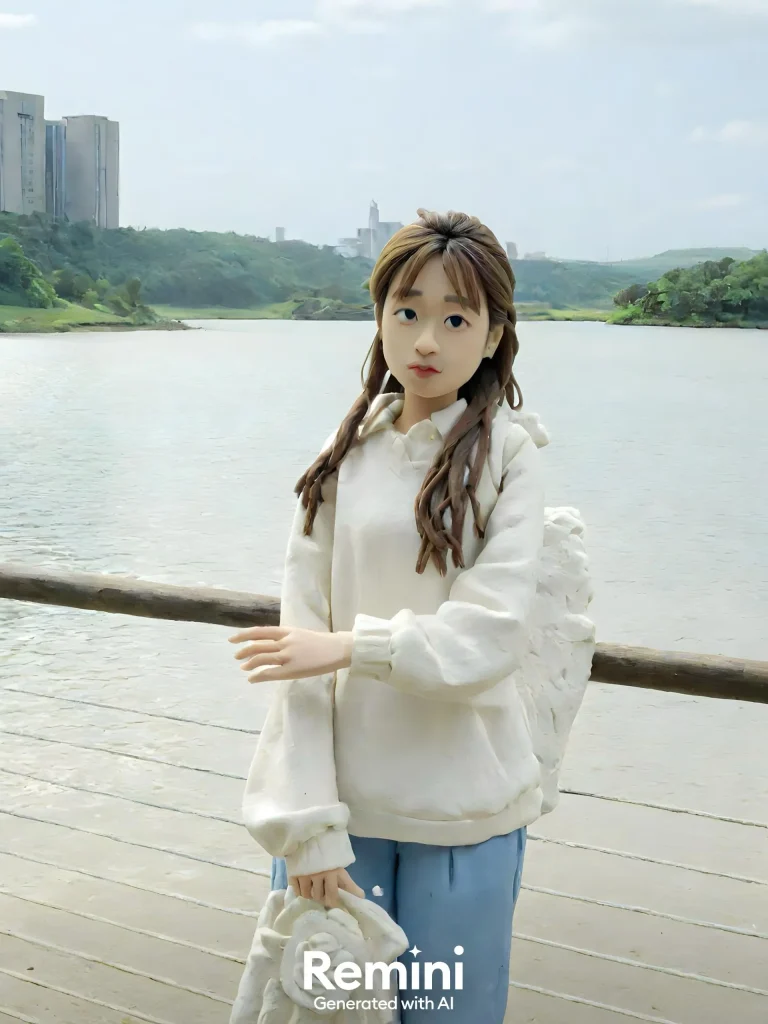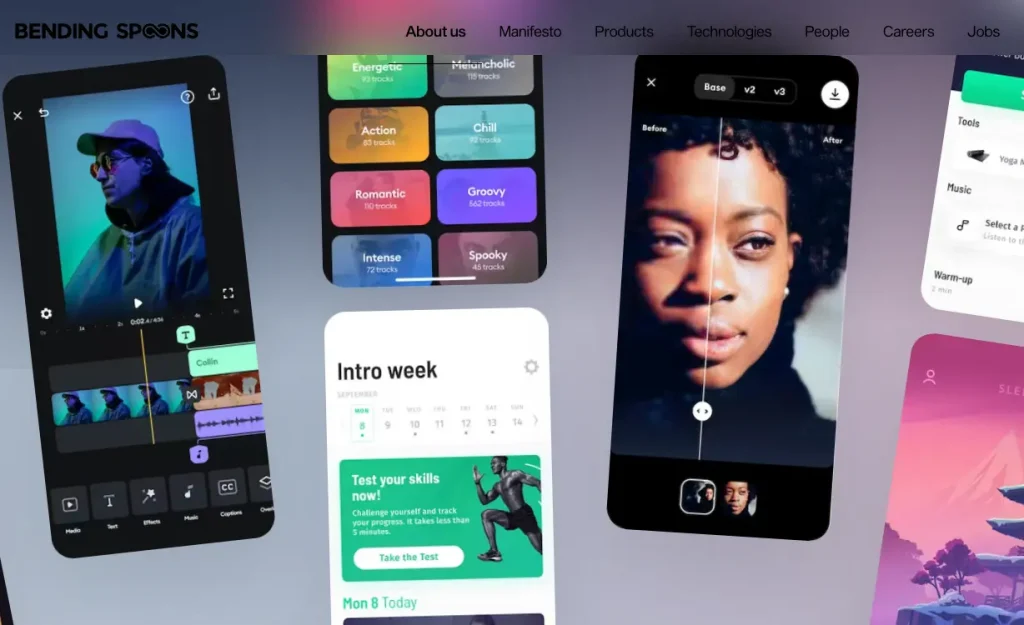- Chinese social media, especially Little Red Book and Douyin (Chinese version of Tiktok) have seen a large number of clay-style photos of people with a thick “Shaun the Sheep” style.
- Most of these photos come from Remini, an AI photo-enhancing app that focuses on scientific research and application in AI image processing. The founding team is from China but was taken over by the Italian company Bending Spoons.
- Bending Spoons is more of a magical app factory, with products like the visual editing app Filmic, video editor Splice, Evernote and more. The company’s ability to convert short-term product payments into long-term revenue is staggering.
An app called Remini from an Italian company topped the list of downloads in China beating Tiktok and ChatGPT with a clay filter beloved by Chinese social media users. Being another AI enhancer, why is it so popular, especially in China?
Enter the world of Shaun the Sheep
“The uglier the original photo, the better the clay-style one will look. It’s just so much fun.”
User of Little Red Book who posted clay photos
During the International Labor Day holiday, Chinese social media, especially Little Red Book, WeChat moments and Douyin (Chinese version of Tiktok) have seen a large number of clay-style photos of people with a thick “Shaun the Sheep” style. Ugly and lovely, is most people’s comments of these photos.
This special filter does not make people more beautiful, but makes people even more “ferocious”. However, this unconventional and contrasting effect has inspired people’s curiosity and desire to share, leading to a glut of traffic for the app.
The clay filter not only saves the trouble of beauty retouching, but also gets more attention for its unique style, so it has been widely spread during the peak travel season. Subsequently, more memes and stills from famous movies and TV series were added with clay filters.

Most of these photos come from Remini, an AI photo-enhancing app that users upload, select their favourite filter style, such as clay style, and wait a while for photos to come up. On the Apple App Store free list, Remini was No. 1 for several days and downloads soared to 30W+. According to Data.ai, Remini ranked first for downloads in the seven days from April 30 to May 6. In the prior week, Remini was only ranked 255th.
Remini, originated and limited supply in China
The recent explosion of Remini products in China is a continuation of its global heat, it is not out of nowhere, but a pop-up product launched a new feature, whose popularity is also based on the previous market. This product belonged to the Italian company Bending Spoons.
However, the founding team is actually from China’s Beijing Dagong Technology Company, which was founded in 2018, focusing on scientific research and application in AI image processing, and is committed to bringing disruptive technologies to old photo restoration, image quality enhancement and other industries. The introduction of the Apple App Store highlighted this focus and compared the clarity of photos before and after the repair by moving the boundary bar as a product selling point.

In 2019, Dagong Technology launched a “You and me” App for the domestic market, and at the same time launched the Remini with the same function for overseas markets, which uses AI technology to repair blurry and old photos. Subsequently, these two products quickly became popular in the global market, and the number of users quickly exceeded 10 million.
Nowadays, Remini has only been listed in the iOS app store in China, so only iPhone owners can download and use it, Android owners have to ask for help. Some curious Android users left comments on bloggers’ posts of clay style, posting photos of themselves and asking for their help to add clay filters.
Meanwhile, Remini will be used for free for one week, but it will cost 68 RMB/month for further use, which is about 10 USD/month and the membership of ChatGPT is 20 USD/month. On China’s second-hand trading platforms, subscribers with Remini offered paid services to make peoples’ photos processed, with prices of less than 1 dollar per piece. This limited supply scene has aroused the curiosity of netizens, accelerating the spread and emergence of clay filters.
Followers flocked to the AI filter market
“This filter handles the details well……It will make some associations according to the picture scene, which is more intelligent.”
User of Remini
One user who has experienced this Remini filter summed it up as follows: “This filter handles the details well, for example, when choosing a clay filter, in addition to the face, the clothes, the patterns on the clothes, the bookshelves, toys, tables and chairs in the background have also become clay wind and the picture is more harmonised. It will make some associations according to the picture scene, which is more intelligent.”

AI photo enhancers are not always perfect, and every use may get unexpected results. In the photo above, for example, the character’s floral clay tote is a plastic bag in the original photo, which shows the creativity of this filter. However, the back of the clothes may have been processed into what looks like a backpack due to some identification glitches, which is somewhat confusing.
Some people in the industry said that the technical principle of clay filter is not complicated, through the existing open-source image generation models on the market, such as the LoRA model, with a certain number of clay style photos, models can be trained with the style and characteristics and the process of generating filters is equivalent to AI redrawing, basically achieving the “clay AI” effect. However in actual operation is not as good as imagined, and the user market has been seized by Remini.
After Remini’s rave reviews, Chinese filter software Meitu has also launched a free clay filter function, but Meitu is too heavy on beauty features, less of Remini’s fun task features and expressions, and can also reflect the aesthetic gap between China and Western countries to a certain extent.
In addition, Remini has launched its own porcelain doll filter, Jade style, which is called “filters more suitable for Chinese users”, but this special effect seems to be a bit weird, vaguely presenting a kind of Chinese horror, and setting off a discussion are far less than clay effects.
Also read: Adobe’s new Firefly Image 3 adds genAI features to Photoshop
Is this trend just a case of ‘right place right time’?
Some say the outturn was brought about by a combination of innovative AI-generated technology, the need for holiday social sharing, and low barriers to entry for free trials. This popularity does occupy the right place at the right time, but there must be other products accounting for these factors. Remini’s popularity is better than ever.
Many people are negative about AI-generated photos precisely because they are so human-like, but the flaws in details such as hands and ears are off-putting. Rather than being an AI special effect, the clay filter is a stylised caricature that generates not real people, but clay. These types of photos also go some way to circumvent the Uncanny Valley effect, and in some cases show the creativity of the AI creation.
The Uncanny Valley effect describes the positive and negative reactions humans exhibit when they see human-like objects. The more human-like its appearance and behaviour, the more we can empathise with it. However, when they become too realistic but less human-like, our brain’s visual processing system becomes confused and develops aversion. The degree of certainty between the two greatly affects our perception of new technology.

Also read: Taylor Swift AI images are ‘shocking and scary’, says Satya Nadella
Remini cleverly uses the ability of AI and uses the advantages of the scene to avoid the weaknesses of AI, making Remini a C-end product that is more easily accepted by more people. On the other hand, the clay style, which is different from the traditional aesthetic, also reflects the unique pursuit of beauty by contemporary young people, who are eager to define beauty through self-expression and innovation.
Bending Spoons: Turn the short-term product into actual profit
“We took pretty much the opposite direction of building a platform that’s optimised for operating, developing, and scaling a variety of digital products.”
Luca Ferrari, co-founder and CEO of Bending Spoons
Image tool software is very easy to explode, but the heat is difficult to continue the track. But this is not the first time that Remini has made a splash on social media, the previous two being “Baby AI Generator” and “See Your Future”. Last year Remini dethroned META’s Threads, which topped the US App Store for a week.
Several AI practitioners said that it is a big challenge to make toC AI products in China, and users are not willing to pay. One investor put it bluntly, “People are used to ‘free-riding’ and find everything expensive.” Many users who have tried this Remini have made it clear that they will not pay again after the trial expires. “Too expensive. I just tried it and paid for it”, said one user.
Remini’s parent company, Bending Spoons, is more of a magical app factory, founded by three young Italians, Luca Ferrario, Francesco Patarnello, and Matteo Danieli, that monetises in a different way than the vast majority of AI tech companies. In addition to Remini, Bending Spoons has acquired the visual editing app Filmic, video editor Splice, Evernote and more.

Many of these apps were already little known before the acquisitions, but with Bending Spoons’ strong commercialisation boost, active and paying users have increased significantly. The company’s ability to convert short-term product payments into long-term revenue is staggering.
As of April 2024, the company’s products have about 100 million MAUs (monthly active users), according to Bending Spoons and Remini generated $4 million in revenue on iOS in March, according to Sensor Tower.

